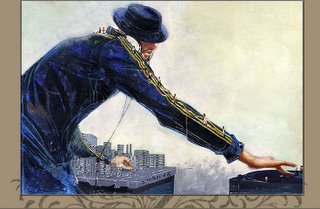With guests coming by this Saturday, I was expecting to spend a good chunk of the day cleaning up the house. If I could get a chunk of the housework done before Friday, then that day would be spent doing last minute shopping and some cooking for Saturday. Well, that was the plan at least. Also part of the plan was to get at least some of the shopping done earlier in the week so that at least part of Friday could be spent cooking and decorating the tree (lights are on, but little else). She who would be named "Queen of Lists" had already assisted in this area, helping me gather my thoughts and organize my route so that shopping would be a brief and successful experience.
So it was, with master list in hand, that I set off yesterday morning to do a bit of shopping in Seattle as well as locally. Traffic was heavy. The holiday season has come and with it extra people on the roads. To add to the congestion, we're having our annual Xmas rains which are causing slick streets and are assisting in accidents. My short jaunt turned into a 4.5 hour journey.
That's not to say that it was entirely the fault of traffic. Nor was it the fault of the Queen of Lists, as her route and directions were superbly plotted. No, I'm afraid that I am the one entirely at fault. You see, I love this time of year to shop. I'm not one who gets off on "retail therapy". Frankly, the crass commercialism of the season and the lack of feeling behind so much gift giving appalls me.
Rather, what I love is the hustle and bustle of humanity. I love walking into the shops, seeing and hearing the people. Some of the people are kind, generous, and walk around with good cheer. Other people are stressed and likely to snap at clerks. Still others are quite mad and display it in both their driving and lack of direction. For once, the stores seem to be packed with all of these types of folks and more and they are, for better or worse, interacting. Despite the stress and the push and shove, the whole scene has a calming effect upon me which is the opposite of what I would expect.
I've never understood it. It doesn't matter whether, like this year, most of my shopping was done early. There have been years where I've been finishing my present purchases on Xmas Eve - walking around making last minute decisions - and yet, I still feel that calm euphoria. It puts a smile on my face. Granted, I often walk around with a smile on my face which, depending upon one's perspective, can emote a Zen-like quality or the image of the town fool. For this time of year, it is a sign of my contentment.
My first stop yesterday was PFI (Pacific Food Importers). My mission, according to Queen of Lists, was marzipan. PFI sells fresh marzipan in a cooler at a much discounted price compared to fancy grocers. The parking lot was full and the place was packed. I heard several languages spoken, including Italian, Indian, and 2 others that sounded East European. A young boy speaking Italian ran through the aisles showing off the candies and cookies to his mom. Two young men, clearly not familiar with the store, asked if there was a number system for the deli counter (there isn't). An older woman at the register explained/apologized that she doesn't get to the store often any more now that she's alone. The patient clerk listened to her tale then suggested that she get some girl friend's together to come down with her more often.
Uwejimaya was the second store on my list. Well, to be honest, it wasn't on my list. This was my excursion exclusively. The Queen could not know why I was going there for it was to be the place where I picked up her major gift - the last I needed to buy this year. While there, I also picked up a few other items, including Ryuichi Sakamoto's
'05 album (his second release of solo piano recordings by him featuring mostly songs from his back catalog, Note: I did NOT pay Amazon's price on that). Going to Uwejimaya is often a treat. It's a huge Pan-Asian grocery with a food court, Hair Salon, optical store, book store, florist, and more. It features food items that cannot generally be found anywhere else. It's often busy, but at this time of year it is packed with people. A busy manager at the bookstore, spoke in a Japanese accent to his clerk, asking her to get the phone. She replied, with her American accent, in mocking, teasing tones, "Yes, Mr. Big Boss Man". But the phone stopped ringing and she offered to help me instead. At another counter, a clerk with a heavy Chinese accent, asked the woman behind me in line if she wanted her package gift wrapped. The customer didn't understand the clerk, so after the third "What? I don't understand", spoken in louder, slower syllables each time, I intervened with "translation".
A quick trip to the liquor store was next. The Queen did not have the store on her list, but we needed Kirsch for fondue this weekend. I also wanted to surprise her with a new martini recipe that I saw in the newspaper earlier. It used limes, pineapple juice, and vanilla cognac (and it was GOOD - email if you want the recipe, or just stop by on Saturday and I'll make you one).
After driving back to the east side of Lake Washington, I stopped at Costco. This was a Queen approved stop. We needed eggs for the eggnog and Costco has the best prices. I also grabbed a couple of other items, including cheese for the fondue and salad mix for us. Costco is always a zoo. Most people seemed very patient there. Some frantic souls wandered through, but it was overall relaxed. A woman with a French accent was cutting samples of pears and told me it was "very French" to enjoy pears with cheese for dessert. I took a sample of pear, but told her I could not use 6 pounds of pears. She started naming off ways to prepare pears for dessert. But, I only need 3 pears, I told her, for my Pear Upside Down Cake that I plan to make. She had never heard of such a thing and so we chatted about what went into it. She was good and really tried to work me into buying the bag, but I wasn't going for it. Still, the chat was pleasant.
Costco was followed by a quick stop at Coast to Coast hardware for some cleaner for the stainless steel range. Then I ran to the Grocery Outlet store (they sell smoked salmon for $7.99 for a pound...it's not top range quality, but it's still delsih and one helluva price). Finally, a quick stop at Albertson's for limes and pineapple juice.
Despite the traffic, the lines, and mad people I came home and still had a smile on my face. With good cheer, I wrapped my presents for the Queen and placed them under the tree. I cleaned house a little less than I expected, but it was progress. I listened to the beautiful Ryuichi Sakamoto album that I purchased earlier, then I switched to Xmas music from our collected. When Shawn came through the door, I had a drink waiting for her. The new martini went over well: she enjoyed 3 before the night was done!
Today will be spent catching up on the cleaning and beginning to decorate the tree. Tomorrow, Shawn is off work. We'll do last minute grocery shopping for Saturday and Sunday, then we'll do some prep work for our Xmas Eve guests. Everything is on schedule and I'll get to enjoy that euphoric feeling in the crowds one more time before the weekend.
Yep, I love it.
































